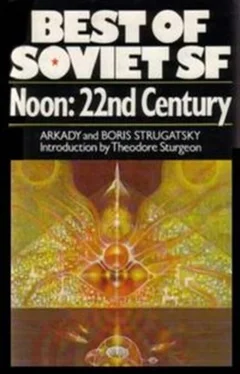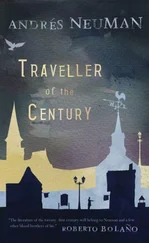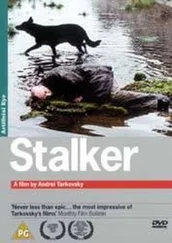When Galtsev had said “Nonsense” for the fourth time, Sidorov got out of the car. Sorochinsky shut his mouth and jumped up at the sight of him. He had half an unripe watermelon, with a knife sticking out of it, in his hands. Galtsev continued sitting with his legs crossed.
“Would you like a watermelon, sir?” asked Sorochinsky.
Sidorov shook his head and, with his hands in his pockets, started looking at the top of the knoll. The red reflections from the polished surface of the Egg were dimming before his eyes. It was getting dark fast. A bright star suddenly rose out of the darkness, and slowly crawled through the black-blue sky.
“Satellite Eight,” said Galtsev.
“No,” Sorochinsky corrected with assurance. “That’s Satellite Seventeen. Or no—the Mirror Satellite.”
Sidorov, who knew that it was Satellite Eight, sighed and started walking toward the knoll. He was utterly fed up with Sorochinsky, and anyhow he had to inspect the movie cameras.
On the way back, he saw a fire. The irrepressible Sorochinsky had built a campfire and was now standing in a picturesque pose, waving his arms. “… the end is only a means,” Sidorov heard. “Happiness consists not in happiness itself, but in the pursuit of happiness.”
“Somewhere I’ve read that,” said Galtsev.
Me too, thought Sidorov. Many times. Should I order Sorochinsky to go to bed? He looked at his watch. The luminous hands showed midnight. It was quite dark.
The Egg burst at 2:53 a.m. The night was moonless. Sidorov had been drowsing, sitting by the fire, with his right side turned toward the flame. Red-faced Galtsev was nodding nearby, and on the other side of the fire Sorochinsky was reading a newspaper, leafing through the pages. And then the Egg burst, with a sharp, piercing sound like that of an extrusion machine spitting out a finished part. Then the hilltop glowed briefly with an orange light. Sidorov looked at his watch and got up. The hilltop stood out fairly sharply against a background of starry sky. When his eyes, blinded by the campfire, had adjusted to the darkness, he saw many weak orangeish flames, slowly shifting around the place where the Egg had been.
“It’s begun,” Sorochinsky said in an ominous whisper. “It’s begun! Viktor, wake up, it’s begun!”
“Maybe you’ll finally shut up now?” Galtsev snapped back. He also whispered.
Of the three, only Sidorov really knew what was going on on the hilltop. The embryomech had spent the first ten hours after activation adjusting to its surroundings. Then the adjustment process had ended, and the embryo had begun to develop. Everything in the Egg that was not needed for development had been cannibalized for the alteration and strengthening of the working organs, the effectors. Then the shell was broken open, and the embryo started to nourish itself on the feed at its feet.
The flames got bigger and bigger, and they moved faster and faster. They could hear a buzzing and a shrill gnashing—the effectors were biting into the ground and pulverizing chunks of tuff. Flash, flash! Clouds of bright smoke noiselessly detached themselves from the hilltop and swam off into the starry sky. An uncertain, trembling reflection lit up the strange, ponderously turning shapes for a second, and then everything disappeared again.
“Shall we go a little closer?” asked Sorochinsky.
Sidorov did not answer. He was remembering how the first embryomech, the ancestor of the Egg, had been tested. At that time, several years before, Sidorov had been a complete newcomer to embryomechanics. The “embryo” had been spread throughout a spacious tent near the Institute-eighteen boxes of it, like safes, along the walls-and in the middle there had been an enormous pile of cement. The effector and digestive systems were buried in the cement pile. Fischer had waved a hand and someone closed a knife switch. They had sat in the tent until late in the evening, forgetting about everything in the world. The pile of cement melted away, and by evening the features of a standard lithoplast three-room house, with steam heating and autonomous electrohousekeeping, had risen out of the steam and smoke. It was exactly like the factory model, except that in the bathroom a ceramic cube, the “stomach,” was left, along with the complicated articulations of the effectors. Fischer had looked the house over, tapped the effectors with his foot, and said, “Enough of this fooling around. It’s time to make an Egg.”
That was the first time the word had been spoken. Then had come a lot of work, many successes, and many more failures. The embryo had learned to adjust itself, to adapt to sharp changes of environment, to renew itself. It had learned to develop into a house, an excavator, a rocket. It had learned not to smash up when it fell into a chasm, not to malfunction while floating on waves of molten metal, not to fear absolute zero… No, thought Sidorov, it’s a good thing that I stayed on Earth.
The clouds of bright smoke flew off the hilltop faster and faster. The cracking, scraping, and buzzing merged into an uninterrupted jangling noise. The wandering red flames were forming chains, and the chains were twisting into queer moving lines. A pink glow settled over them, and he could already make out something enormous and bulging, rocking like a ship on waves.
Sidorov again looked at his watch. It was five to four. Obviously the lava and tuff had turned out to be eminently suitable material—the dome was rising much faster than it had on cement. He wondered what would come next. The mechanism built the dome from the top down, as the effectors dug deeper and deeper into the knoll. To keep the dome from ending up underground, the embryo would have to resort either to driving piles for support, or to moving the dome to one side of the pit dug by the effectors. Sidorov imagined the white-hot edge of the dome, to which the effectors’ scoops were molding more and more bits of lithoplast heated to malleability.
For a minute the hilltop was plunged into darkness. The din ceased, and only a vague buzzing could be heard. The embryo was readjusting the work of the energy system.
“Sorochinsky,” said Sidorov.
“Here!”
“Get over to the thermocamera and shove it up a little closer. But don’t climb the knoll.”
“Yes, sir.”
Sidorov heard him ask Galtsev for the flashlight in a whisper, and then a yellow circle of light bobbed over the gravel and disappeared.
The noise started again. The pink glow reappeared on the hilltop. Sidorov thought that the black dome had moved a little, but he was not sure about it. He thought with vexation that he should have sent Sorochinsky to the thermocamera right away, as soon as the embryo had burst from the Egg.
Then something gave a deafening roar. The hilltop blazed up in red. A crimson bolt of lightning slowly crawled down the black slope, then disappeared. The pink glow turned yellow and bright, and was immediately obscured by thick smoke. A thundering blow struck his ears, and with horror Sidorov saw an enormous shadow which had risen up in the smoke and flames which shrouded the hilltop. Something massive and unwieldy, reflecting a lustrous brilliance, started rocking on thin shaky legs. Another blow thundered out, and another glowing bolt of lightning zigzagged down the slope. The ground trembled, and the shadow which had appeared in the smoky glow collapsed.
Sidorov started running along the knoll. Inside it, something crashed and cracked, waves of hot air shimmered at his feet, and in the red, dancing light Sidorov saw the movie cameras—the sole witnesses of what was happening on the hilltop—starting to fall, taking lumps of lava with them. He stumbled over one camera. It wobbled, spreading wide the bent legs of the stand. He moved more slowly then, and hot gravel rained down the slope toward him. It quieted down above, but something still smouldered in the darkness there. Then another blow resounded, and Sidorov saw a weak yellow flash.
Читать дальше












